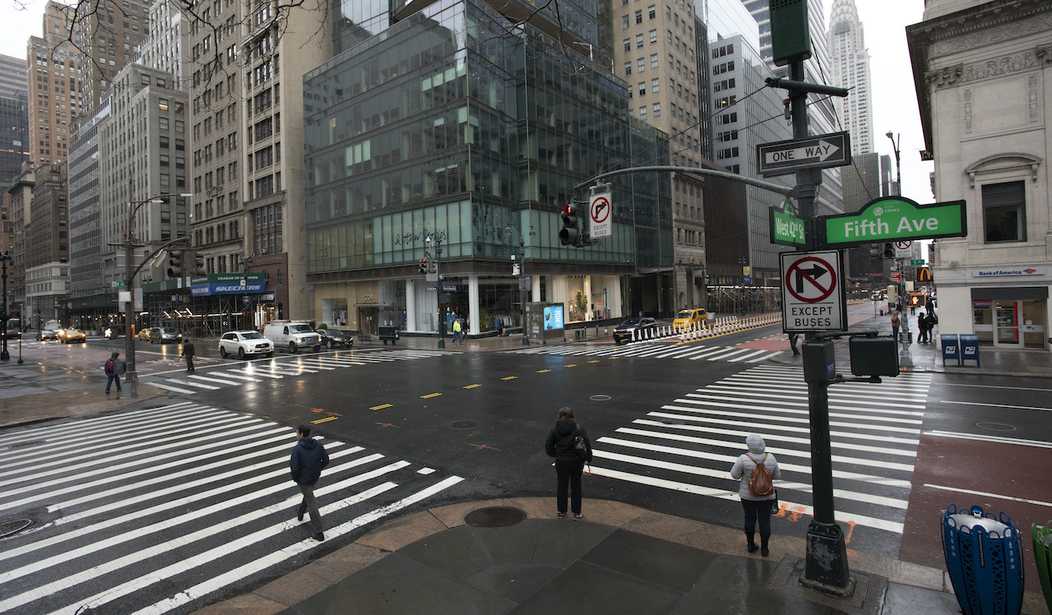The coronavirus, widespread quarantines, an unprecedented self-induced recession, and unchecked rioting, looting and protesting — all in a presidential election year — are radically disrupting American habits and behavior.
Rents, home prices and office occupancy rates in major cities, especially on the two coasts, are dropping fast. Techies and young professionals have discovered that they can work from home without paying sky-high housing costs in order to be close to the office.
Those more fortunate wonder why they should get bogged down with commutes and urban traffic — or navigate city sidewalks amid homelessness, crime, racial tensions and urban unrest — when they can make as much money while staying distant in quieter landscapes.
Some react by moving to quieter, low-tax states such as Idaho, Tennessee or Utah. Others flee New York City or the Bay Area/Silicon Valley corridor to upstate New York or California’s Central Valley. Who would have ever believed that housing prices in picturesque San Francisco would be falling while housing prices in pedestrian Sacramento and Fresno are soaring?
During the recent urban renaissance, young people had flocked to cities to be where the action was. Now, do they want to deactivate and find some independence and peace from the relentless chaos?
Worries about COVID-19 in high-density cities and unreliable city services add to the unhappiness. Residents want less dependence on mass transit and elevator living. Constant human contact is seen more as risky than desirable.
Gun sales are at record highs. When some cities take steps to defund police and some soften bail laws, citizens quietly go to the local gun store and stock up on ammunition. Many of the people who have never before owned firearms are no longer clamoring for gun control. A “man’s home” is now becoming his armed castle.
The Coronavirus Revolution: How Social Distancing Can Change America for Good
As a general rule, any business or activity that does not bother, judge or lecture Americans and instead allows them to work or relax in peace is preferred. That may explain why Zoom and Skype use is soaring while TV ratings for the woke NBA and NFL are down.
Why are Amazon and Walmart booming while smaller businesses are going broke? Largely because home delivery better serves those who are barricaded at home, terrified both of the virus and government reaction to it.
Family businesses are not vertically integrated. They have few cash reserves and no special insider exemptions from government officials. How ironic that in our quest to become safe and in control of our own destinies, we empower the anonymity of huge conglomerates and erode the viability of reliable, service-friendly, mom-and-pop stores.
For the first time in their careers, many teachers and professors are careful not to go off-topic and rant to their high school and college students. Their video streams are not only seen by captive classroom audiences but occasionally peeked in on by the parents and taxpayers who pay their salaries.
This is the first autumn in memory that a huge percentage of college students are staying home. And no one is sure of the ensuing consequences.
Will students revolt over borrowing money simply to watch lectures on their basement computers? Will they be less likely to vote in November when they are isolated at home, rather than congregating on campus near polling places and subject to constant peer pressures to vote — and to do so in predictable ways?
With college revenues dropping, will ambitious promises to hire more diversity administrators, build more self-segregated racial theme houses and increase campus social services be seen as just more costly overhead that shorts classroom teaching?
During the pandemic, government has become more intrusive and yet seemingly more impotent and incompetent. Pick a month and some government official issues yet more contradictory orders on mask wearing, social distancing and lockdowns — all to be soon reversed.
Taxes stayed high and yet urban services got worse. Increasingly, American city dwellers don’t always count on the power going on when they flip the switch, or the bus or train always showing up, or the police always answering 911 calls.
We still do not know the full consequences of these radical changes in American life, especially whether they will continue after the COVID-19 virus abates and quarantines end.
The cultural currents are often contradictory. They defy easy political analysis and seem at times counterintuitive.
But there is one historical constant.
When institutions and politicians cannot accommodate radically changed circumstances, people will no longer value institutions and politicians. In their place, citizens will seek to ensure their own livelihoods, leisure and safety in ways that are more reliable and affordable — with their circumstances in their own hands rather than in those of distant others.
And their adjustments won’t always be calm or polite.
Victor Davis Hanson is a classicist and historian at the Hoover Institution, Stanford University, and the author of “The Second World Wars: How the First Global Conflict Was Fought and Won,” from Basic Books. You can reach him by e-mailing [email protected].









Join the conversation as a VIP Member